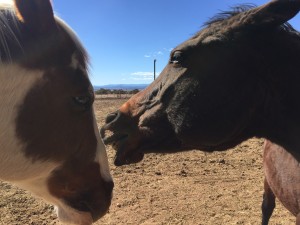 In horse training, leadership is discussed a lot. If the person doesn’t have leadership, the horse will not be as responsive to them. There are people who are born with innate leadership. In horses, leadership potential can be recognized the moment the foal drops to the earth.
In horse training, leadership is discussed a lot. If the person doesn’t have leadership, the horse will not be as responsive to them. There are people who are born with innate leadership. In horses, leadership potential can be recognized the moment the foal drops to the earth.
A breeder friend of mine once said, of certain foals, they recognized it in themselves and you as a person could immediately recognize this presence, this ability to be a leader. It wasn’t necessarily attached to physical attraction or size. It generally has to do with the presence of the individual and their awareness and caretaking ability, of other members of the herd.
The horse, whether mare, stallion or gelding, who takes care of the herd, is the leader. Others in the herd may also exhibit leadership skills, and show it in different ways. In my herd, for example, I have one who is a strategist, administrator, who organizes the other horses, who has her hoof on the pulse of their needs. She makes sure the others are listening, and maintains quiet, persistent influence. She is not top of the pecking order. Few on the outside would recognize all that she does and how important she is. Yet, the horses all know it.
The horse who many consider the “leader” of my herd, who pushes others around and wants all the food, came into my herd way too bossy. She has caretaking skills but they were only exhibited with me and otherwise were buried under aggressiveness with the other horses. I had observed her in her childhood herd and she was quite different, a recognized leader. It took time for her to develop herself in relationship to the new herd. I know she needs to be a leader, it’s built into her.
I have worked with her at liberty to help her to understand her role in the herd.
This mare is very powerful in her own right. She has good listening and tracking skills, a big heart, and is developing her caretaking skills every day. Her aggressiveness has toned down as she is recognized for her finer qualities. The other horses view her less with fear as she shows them more empathy. They are moving toward a shared vision as these dynamics change.
My gelding who passed away last year was a fine leader. He would push horses off food but in the nicest way. He was friendly to most horses, no matter what their rank, played with them as equals, and loved people as well. As he aged, he began delegating duties but everyone always knew he was in charge and it was undisputed because they felt safe in his care.
People may argue that leadership in horses is different than in people. This is both true and false.
When people who are leaders in their companies, CEOs or teachers and others, come to work with horses, their strengths and weaknesses as leaders show. Some people have wonderful leadership skills with humans as well as horses and this will be evident.
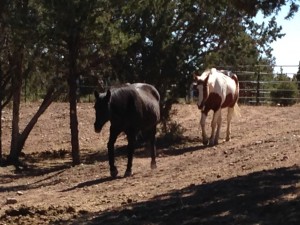 Those whose management styles are more dictatorial will not be so successful with horses. They may embody fear and create submission in the horse, but they will never earn their trust and respect.
Those whose management styles are more dictatorial will not be so successful with horses. They may embody fear and create submission in the horse, but they will never earn their trust and respect.
There are those who send mixed messages and will confuse the horse and make him unable to respond because he won’t know what the task is. They will create an unsafe, unresponsive horse.
Those whose management style includes an interest in the individual, choices, and firm boundaries will be successful with both people and horses. There will be trust and respect and possibly joy in their relationship.
Those who are calm and willing to see the horse’s strengths, and adapt their management style to the capabilities of the horse, will likely be successful.
The educated horse is a safe horse, as is the educated rider or horse handler. You may counter, well horses don’t read books or watch the news. Horses watch every little thing going on in their world. They know where each of the other horses are, where the food and water are, what is going on down the road in the ravine, and where the open gate is. They are constantly tracking their environment. They have far advanced radar to humans. They have to always be in the lookout in case of predators or other danger.
In recent months, I have looked at the state of affairs among humans very closely. I try to imagine how horses would respond to the humans professing to lead.
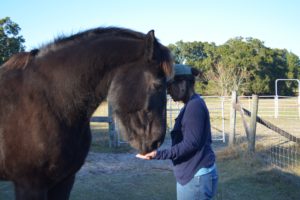 Those people who react suddenly, emotionally, in anger or outrage, who will not let go of insults, those who have no concern for the welfare of the human herd, those who create fear and confusion, those who do not provide what the people need, will not be leaders. Their herd will divide and live in chaos.
Those people who react suddenly, emotionally, in anger or outrage, who will not let go of insults, those who have no concern for the welfare of the human herd, those who create fear and confusion, those who do not provide what the people need, will not be leaders. Their herd will divide and live in chaos.
In contrast, those who remain calm and introspective, thoughtful, educated, with caretaking skills born of empathy, who do not get caught up in petty arguments, who emit clear signals, take care of basic needs and do not create fear, will be leaders. They even may be natural born leaders. In wild herds, some horses who may seem a threat to the herd or behave badly are sent away from the main herd to form their own bands. In the original herd, there may be disagreement but there will be a shared vision to move toward.
This difference is profound, with people exhibiting varying degrees of the above traits, of course.It is written in the I Ching, a vast compendium of knowledge on the natures of all types of people and ultimately, what you can expect from them. The horse will help you find your way in working with your energy around them.
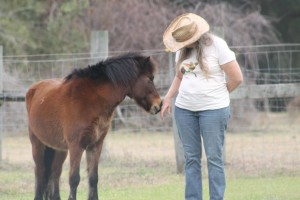
Some of the same differences are in horses, but horses are more transparent and not given to the same types of subterfuge and intellectual trickery as people. They are generally happy with clear boundaries and their basic needs met. Some don’t get along with each other, true. But they are honest all the way through, unless they have been tampered with by cruel or unknowing people.
So you can see our effect on the horse is critical. We are very important in the equation. When you say, “well, my horse won’t do this,” let’s go back to the beginning.
There is a difference between emotion and thought. If the horse doesn’t do what you ask, look at why. Pull it apart, find out what the resistance is. A purely emotional response will get you nowhere.
The reason could be physical, or it could be emotional or it could be the relationship between horse and owner needs to be revisited. It is also about recognizing that code of behavior of what is acceptable and what is not, within the horse world. Leadership requires also looking at the health, diet, environment and overall well-being of the individual, whether horse or human. It is a global, educated, holistic view and how to address the challenge will depend on the individuals.
(c) Susan Smith, Horses at Liberty Foundation Training, Equine Body Balance (TM)
Please see my
Events for information on upcoming clinics and workshops.



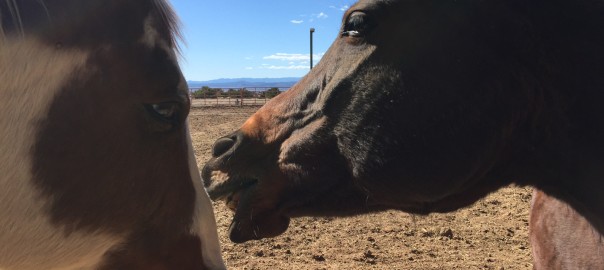
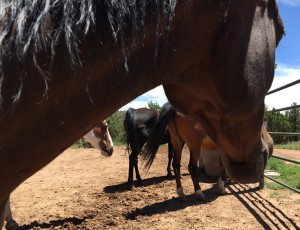
Good read thank you =-) Deb
Susan – Thank you for this timely and thoughtful post. I appreciate how you tie the challenging times we are coming into in the human world with our work with horses. To me, it is all a part of the bigger picture, one we always need to be aware of, because the horses are! And not to get lost or escape into our work with them, pushing the reality of our existence aside. Blessings to you and all you share 🙂
Thanks for writing, Sara. I imagine with your big herd, you get to experience first hand the horses’ truth every day! Hope to catch up with you this year!